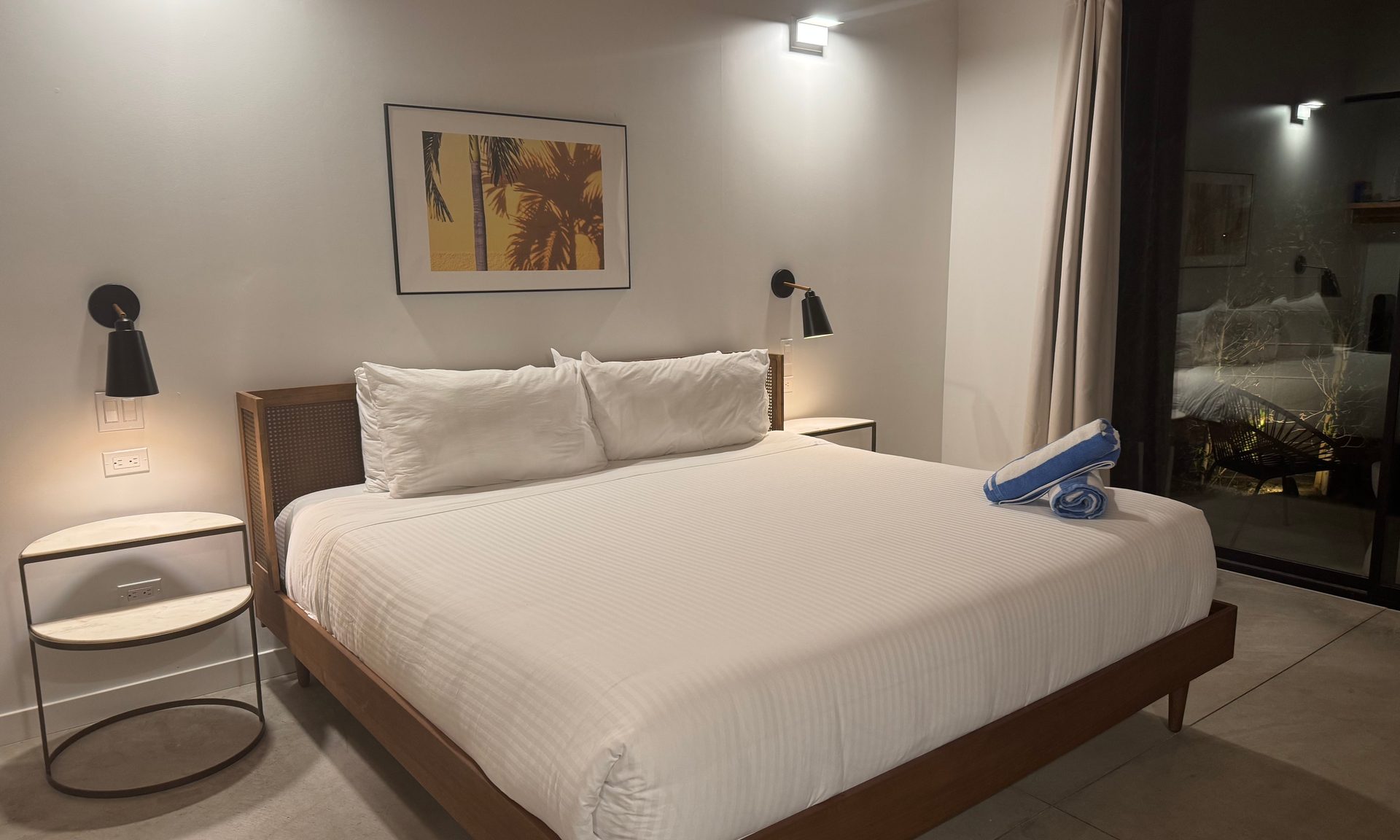7 Best Airbnb Alternatives: Book Better Vacation Rentals
Airbnb may dominate the market, but other better options (that may work better for you) include Vacasa and Vrbo.

Many or all of the products on this page are from partners who compensate us when you click to or take an action on their website, but this does not influence our evaluations or ratings. Our opinions are our own.
Airbnb holds a dominant grip on the vacation rental industry, making it challenging for travelers to explore alternatives. Unlike the hotel industry, where competition is robust, the vacation rental market is largely ruled by Airbnb — but it's not the only option. Many Airbnb competitors are expanding their portfolios to meet growing demand.
In fact, for people disenchanted by Airbnb, there are options that are not just far better, but they're quite good.
Some Airbnb competitors cater to niche travel needs, such as glamping through Hipcamp or high-quality urban rentals via Booking.com. These platforms often provide unique benefits and experiences that Airbnb can't match.

By signing up, you will receive newsletters and promotional content and agree to our Terms of Use and acknowledge the data practices in our Privacy Policy. You may unsubscribe at any time.
Here’s a closer look at some alternatives to Airbnb, each catering to specific travel preferences. If you're ready to explore new ways to book accommodations, these options might surprise you.
On this page
- 1. Vrbo: best Airbnb alternative with a loyalty program
- 2. Booking.com: best for international travel
- 3. Vacasa: best for professional management with hometown flair
- 4. Hipcamp: best for glamping (or just plain camping)
- 5. Homes & Villas by Marriott Bonvoy: best for Marriott members
- 6. Local vacation rental management companies: best for supporting small businesses
- 7. Resorts with private cabins and cottages: best for the added benefits of a hotel
- What to watch for next: Apartment Collection by Hilton
- How to choose the best Airbnb alternative
1. Vrbo: best Airbnb alternative with a loyalty program
- Good: Powerful search tools and a loaylty program called One Key.
- Bad: Confusing cancellation policies and no shared-space listings.
- Use it when: You want to comparison shop.
Vrbo, in many ways, is the Lyft to Airbnb’s Uber. Think of Vrbo as Airbnb's slightly nerdier cousin. And hey, Vrbo plays second fiddle for a reason.
While it has fewer listings overall, its hidden gems are often worth the search.
Vrbo's standout feature is its loyalty program, One Key, which spans across the Expedia Group ecosystem. This allows you to earn 2% back in OneKeyCash on eligible bookings, redeemable across Hotels.com, Expedia and Vrbo.
🤓 Nerdy Tip
Use Vrbo's "total price" filter to avoid hidden fees and compare costs accurately. If you do book through Vrbo, just beware of user-unfriendly cancellation policies and lesser customer support than what Airbnb allows (including longer response times).
» Learn more: What is Vrbo and how does it work?
🤓 Nerdy Tip
With the 2026 FIFA World Cup boosting demand in host cities like Las Vegas, Philadelphia, Miami, Dallas, and Jersey City/Newark, book early in these markets. RevPAR (revenue per available rental) is projected to surge in World Cup destinations, which may translate to higher prices for travelers. 2. Booking.com: best for international travel
- Good: More professionally managed properties. Loads of international properties.
- Bad: Limited portfolio. Little charm or personality.
- Use it when: You’re looking for hassle-free accommodation when traveling internationally.
Booking.com is known internationally as a major flight and hotel search tool, yet it also offers vacation rentals.
Many of the properties, especially in major international cities, are for apartments in professionally managed buildings. Like Vacasa, the professional management increases your likelihood of a drama-free trip. For travelers, that means booking and checking into these apartments is less of a hassle.
In general though, Booking.com accommodations tend to lack the charm and character of some of Airbnb’s (or even Vacasa's) more colorful listings.
3. Vacasa: best for professional management with hometown flair
- Good: High-quality standards, local expertise, diverse portfolio.
- Bad: Limited availability compared to giants like Airbnb or Vrbo.
- Use it when: You prioritize excellent property condition, local knowledge, and unique finds.
Vacasa takes a different approach to vacation rentals. Instead of solely listing individual properties, it acts as a full-service vacation rental management company, partnering with homeowners to professionally manage their properties.

Guest can expect:
- High-quality standards: Vacasa properties undergo rigorous inspections and adhere to strict cleaning protocols, ensuring a consistent and comfortable experience.
- Ability to book on points: Vacasa has formed some pretty unique partnerships with platforms like Homes and Villas by Marriott International, Wyndham Rewards and American Express Travel, which makes it possible to book vacation rentals on points.
- Diverse portfolio: With 40,000 homes across the U.S., Canada, Belize, Costa Rica and Mexico, Vacasa manages a wide range of properties, from cozy cabins to beachfront condos. For example, a rental we tested in Wilmington, North Carolina came in a charming Neo-renaissance style (it was built in 1902 though had since been fully updated), making for a welcome contrast to the generic Hilton and Best Western properties nearby.
- Robust app: Throughout the rental experience, Vacasa's web and mobile app experience is seamless. It's easy to get check-in instructions both via text and within the app, and the in-app process for checkout is intuitive. If there is a problem, Vacasa promises 24/7 customer support.
However, Vacasa's got one big drawback, and that's limited availability. Sure, Vacasa is considered the largest vacation rental management platform in the U.S., but its 40,000 vacation home listings are still puny compared to Airbnb's estimated 7 million active listings worldwide. Additionally, Vacasa is primarily only operational in North America. If you're seeking a vacation rental in, say, Europe or Asia, don't bother with Vacasa.
Vacasa is a strong contender for travelers seeking a professionally managed, high-quality rental experience with a touch of local charm. Its emphasis on quality and personal touch makes it a good alternative for those who want to avoid the potential pitfalls of individual listings on other platforms.
4. Hipcamp: best for glamping (or just plain camping)
- Good: Cheap, quirky.
- Bad: Rustic. Quality control might be an issue.
- Use it when: You’re looking for a cheap and interesting crash pad on the road.
Hipcamp specializes in camping and glamping options, offering everything from simple campsites to unique stays like yurts and Airstream trailers. It’s an excellent alternative for outdoor enthusiasts.
Just remember, rustic comes with its own charms and challenges.
5. Homes & Villas by Marriott Bonvoy: best for Marriott members

- Good: Earn and redeem Marriott Bonvoy® points, high quality standards.
- Bad: Very limited portfolio, low point value for redemptions.
- Use it when: You want to use Marriott points.
The hotel mega-brand Marriott launched a home rental business in 2019, called Homes & Villas by Marriott Bonvoy.
It has quietly gained popularity among Bonvoy members who enjoy vacation homes, largely due to the ability to earn and redeem Marriott Bonvoy points for these bookings. Particularly if you earned a massive amount of Marriott points through a Marriott Bonvoy credit card, this can be a way to put them to use.
Because Airbnb and most of its competitors lack rewards programs, that makes it difficult (or impossible) to book a vacation rental for “free” using points. But because Marriott Bonvoy points are relatively easy to earn through credit cards and transfer partnerships, Marriott Homes and Villas offers an option to book a vacation rental without handing over any cash.
Now the redemption value for using Bonvoy points to book through the Homes and Villas program isn’t always the best — and can often be pretty bleak. NerdWallet data suggest that Bonvoys are worth 0.8 cents each, so just compare the cash and point costs of booking a rental.
6. Local vacation rental management companies: best for supporting small businesses
- Good: Supports local businesses and hosts.
- Bad: It’s a crapshoot.
- Use it when: Local laws regulate vacation rentals.
Have you ever checked into an Airbnb and been asked by a host to avoid talking to neighbors? That’s likely because the vacation rental is forbidden by local law or the property’s homeowners association.
Popular vacation towns often sport their own local rental management companies. For example, the town of Seabrook, Washington, is composed primarily of vacation rentals that are rented and operated by the town itself.
If you’re having trouble finding vacation rentals through the platforms listed above, it’s worth doing a quick internet search to see if any local operations exist.
7. Resorts with private cabins and cottages: best for the added benefits of a hotel
- Good: All-in-one resort experiences (and the benefits of hotels, including check-in and on-site staff) with unique accommodations and your own four walls.
- Bad: Often higher-priced than traditional vacation rentals.
- Use it when: You want a private retreat with resort amenities.
For travelers who want the privacy of a vacation rental without sacrificing resort-style amenities, resorts offering private, homes cabins or cottages are an excellent option.

Big Cedar Lodge in Missouri is a prime example. Nestled in the Ozark Mountains, Big Cedar Lodge combines the charm of rustic cabins with the perks of a full-service resort. Guests can enjoy outdoor activities like fishing and hiking, as well as access to a spa, restaurants, and even a championship golf course.

Over in Florida, there's Evermore Orlando Resort. Evermore offers hundreds of vacation rentals on one sprawling property, alongside resort-level services such as a 24-hour front desk and on-site dining. Rooms have traditional "home" features like a kitchen, as well as fun features that you'd only expect on vacation, like a slide connecting the floors.
The offering has gone over so well that in January 2025, Hilton wanted to have its hands on it. The hotel giant launched a new partnership allowing guests at Evermore to use Hilton Honors points to book homes through Hilton’s website (they can earn Hilton points during their stays, too).
Whether you're staying in a lakeside cottage, beachfront home or a cozy cabin, this option blends the best of both worlds for a relaxing getaway.
What to watch for next: Apartment Collection by Hilton

There's another option in the pipeline that we'll be watching: Apartment Collection by Hilton.
Launching in the first half of 2026, Hilton will enter the vacation rental market with Apartment Collection by Hilton, a new brand that combines the space and convenience of fully-furnished apartments with the reliability and service that hotel brands tend to deliver. Apartment Collection properties feature dedicated team members available on-site 24/7. This bridges the gap between the unpredictability of peer-to-peer platforms and the consistent service travelers expect from hotels.
What to expect:
- Flexible apartment options: Studio to four-bedroom furnished apartments suitable for everything from solo work trips to family reunions.
- Chef-ready kitchens: Full kitchens with cooking equipment, far beyond the mini-fridges and microwaves typical of hotel suites.
- Separate living areas: Actual living rooms, not just a couch at the foot of your bed.
- On-site laundry: No more packing two weeks' worth of clothes or hunting for a laundromat.
- Urban locations: Properties in sought-after city destinations with easy access to local attractions.
- Hilton Honors integration: Book through Hilton.com, earn points on stays, redeem points for free nights and access member benefits like free Wi-Fi.
Select properties will also feature rooftop pools and terraces, communal workspaces, fitness centers and on-site dining.
Initial launch cities include New York City, Washington, D.C. and Atlanta, with significant expansion planned through a partnership with Placemakr, a furnished apartment operator with nearly a decade of experience in the space.
Why it matters: For the millions of Hilton Honors members who've accumulated points through credit cards and hotel stays, Apartment Collection offers a way to use those points for vacation rentals. That's something that's historically been difficult or impossible with traditional vacation rental platforms. This is particularly valuable for extended stays, family trips or work travel where apartment-style space makes sense but you still want the predictability of a major hotel brand.
The biggest limitation? At launch, availability will be concentrated in a handful of U.S. cities. But if you're traveling to one of those markets and value consistent service standards, this could be a strong alternative to the wild west of Airbnb.
How to choose the best Airbnb alternative
Airbnb might be the vacation rental king, but its crown isn't glued on. For travelers seeking specific features, loyalty programs, budget options, or unique experiences, consider these alternatives – and don't underestimate the value of comparison shopping.
But if you’re dissatisfied with the cost, functionality or safety of Airbnb, good alternatives to Airbnb do exist. None can match the big fish in terms of pure size, but each satisfies a particular travel niche.
Always consider the final cost, including taxes and fees, when comparison shopping among sites like Airbnb (e.g., Booking versus Vrbo). And don't overlook fees on the alternatives, such as potential resort fees.
How to maximize your rewards
You want a travel credit card that prioritizes what’s important to you. Here are some of the best travel credit cards of 2026:
- Flexibility, point transfers and a large bonus: Chase Sapphire Preferred® Card
- No annual fee: Wells Fargo Autograph® Card
- Flat-rate travel rewards: Capital One Venture Rewards Credit Card
- Bonus travel rewards and high-end perks: Chase Sapphire Reserve®
- Luxury perks: American Express Platinum Card®
- Business travelers: Ink Business Preferred® Credit Card
Article sources
NerdWallet writers are subject matter authorities who use primary,
trustworthy sources to inform their work, including peer-reviewed
studies, government websites, academic research and interviews with
industry experts. All content is fact-checked for accuracy, timeliness
and relevance. You can learn more about NerdWallet's high
standards for journalism by reading our
editorial guidelines.
On this page
- 1. Vrbo: best Airbnb alternative with a loyalty program
- 2. Booking.com: best for international travel
- 3. Vacasa: best for professional management with hometown flair
- 4. Hipcamp: best for glamping (or just plain camping)
- 5. Homes & Villas by Marriott Bonvoy: best for Marriott members
- 6. Local vacation rental management companies: best for supporting small businesses
- 7. Resorts with private cabins and cottages: best for the added benefits of a hotel
- What to watch for next: Apartment Collection by Hilton
- How to choose the best Airbnb alternative
Limited Time Only: Earn $1,000 Toward Travel!
Capital One Venture Rewards Credit Card 
Travel

For a limited time, the
Capital One Venture Rewards Credit Card is offering new cardholders an especially rich bonus: Enjoy $250 to use on Capital One Travel in your first cardholder year, plus earn 75,000 bonus miles once you spend $4,000 on purchases within the first 3 months from account opening - that’s equal to $1,000 in travel!
More like this
Related articles









